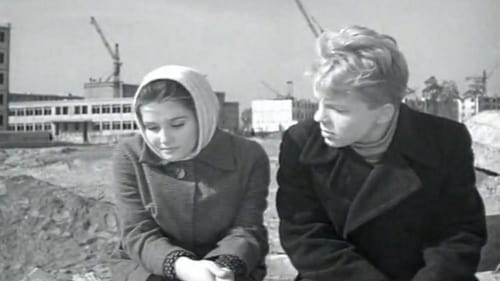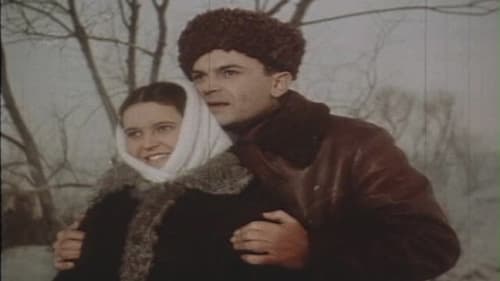
Himself
Aleksandr Ivanovich Medvedkin fue un cineasta ruso nacido en 1900. A los 17 años, fue testigo de la Revolución bolchevique; a los 20 participó en la Guerra Civil, dentro del Ejército Rojo junto a Isaac Babel; a los 38 vivió las purgas estalinistas, y vio cómo su mejor película, "La felicidad", era condenada por reflejar influencias de Bujarin; con 41 años, luchó en primera línea en la II Guerra Mundial, cámara en mano; y murió, en 1989, en plena "perestroika", convencido de que el comunismo, al que él había consagrado su vida, alcanzaba, por fin, su culminación.

Director
Svetlana Vasilievna is a young, energetic woman who often changes jobs, accustomed to achieving the goals that she has set for herself in life. Her next desire is to marry a "creative, intelligent" person.
After a lengthy search, she chose an elderly, but well-mannered, intelligent official Vladimir Dmitrievich Lobanov. Svetlana believes that with the help of connections and sober calculation, you can achieve everything: well-being, respectability, even personal happiness. She does not notice that the fulfillment of her desires does not at all make the person close to her happy. The payback turns out to be unexpected and terrible.

Writer
Mikhail Ulyanov is the Bergmanesque protagonist of the Russian Private Life. A government-appointed factory executive, Ulyanov is reduced to quivering confusion when he is dismissed. Recovering from this blow, he decides to review and realign his life. In so doing, he discovers that there's plenty left in the world to make life worth living. Private Life was nominated for the "best foreign picture" Academy Award in 1983.

Director
Mikhail Ulyanov is the Bergmanesque protagonist of the Russian Private Life. A government-appointed factory executive, Ulyanov is reduced to quivering confusion when he is dismissed. Recovering from this blow, he decides to review and realign his life. In so doing, he discovers that there's plenty left in the world to make life worth living. Private Life was nominated for the "best foreign picture" Academy Award in 1983.

Director
Irina Kupchenko stars in this psychological drama by the renowned director/writer team of Yuli Raizman and Yevgeny Gabrilovich. In the story, she is the entirely respectable wife of a career diplomat, with a teenaged son. Suddenly one day, she decides to leave her marriage and go live with her lover.

Writer

Director

Writer

Director

Writer
High school students Ksenya and Boris are in love but all the world is against them.

Director
High school students Ksenya and Boris are in love but all the world is against them.

Director
Two foolish and frivolous guys cause suffering for the whole youth union at the factory. It was already decided to dismiss Anatoly Grachkin and his friend Victor Gromoboev but they are taken under the wing by Nadia Berestova, a diminutive funny woman, known as the popular one at the plant.
At first, Nadia took it with reluctance and apprehension, but gradually this commission became the most important thing in her life.

Director
A young ordinary communist, Vasiliy Gubanov, was among many who took part in the construction of the most important facility for the young republic, the power plant. He did his job in a way that was beyond human ability. He could love, too, with a passion and a passion for self, but his life was cut short very early.

Director
On falling in love with Sergey, Natasha gives up studies at a pedagogical institute and accompanies him to a construction site. In a course of time she realizes that her husband is interested only in his work. She leaves him, graduates from the institute and works as a teacher. But Sergey is fired for authoritative style of work and Natasha realizes that she must be near to him in his hour of need.

Director
Soviet filmmaker Yuri Raisman once more combines political dogma with solid entertainment values in Dream of a Cossack (aka Cavalier of the Golden Star). The title character, played by future director Sergei Bondarchuk (and billed for obscure reasons as Semyon Bondarchuk), is an ex-soldier who returns home to the Kuban region, there to take up life as a farmer. Instead, he galvanizes the local citizenry into participating in a massive construction project, which will result in a new power station and canal. Thus does Raisman offer an prime example of Russian collectivism while making it seem as though it had sprung from individual initiative. Dream of a Cossack is based on a popular novel by S. Babayefsky.

Director
A biopic of Rainis (born as Jānis Pliekšāns), a Latvian poet, playwright, translator, and politician, whose works had a profound influence on the literary Latvian language, and the ethnic symbolism he employed in his major works has been central to Latvian nationalism.

Director
On the evening of May 9, 1945, when Moscow is noisily and cheerfully celebrating the Victory Day, a young girl agronomist Zina Sokolova and a sailor officer Lavrentyev meet in the compartment of the Moscow-Vladivostok train. The sailor takes the lively, direct character of the girl for windiness and frivolity. Sokolova also reacted frowningly and mockingly to the satellite. To get to know each other better, travelers are helped by nuisance: they are behind the train, and the rest of the way they are together, getting to know people and the life of the country along the way.

Director
Documentary on the fall of the nazi Germany's capital, Berlin, edited and directed by the soviet filmmaker Yelizaveta Svilova

Director
A rare documentary that shows how Soviet war propaganda presented the events of the Finnish front in 1941–1944. The main emphasis is on the resolution of the war. The film contains plenty of unique footage of the final stages of the Continuation War.

Director
Based on the play of the same name by Georgi Mdivani.
In September 1941, lieutenant Ilya Streltsov, who graduated from the flight school, was assigned to the fighter aviation regiment guarding the sky of Moscow. He meets in part the nurse Zoya, with whom he grew up in the same yard and with whom he has long been in love. During the first training flight on the "Seagull", lieutenant Streltsov shot down a German plane and received the nickname "Lucky." Streltsov is jealous of the squadron commander to nurse Zoya, believes that he is finding fault with him. For a whole month he is not allowed to fly sorties. In October 1941, lieutenant Streltsov made his first sortie, he shot down one plane and rams the second. For this battle, he is awarded the title Hero of the Soviet Union.

Director
La tumultuosa vida de un joven operador de telégrafos durante los años de guerra.

Director

Writer
On one of the October nights at the ball, gymnasium pupils and officers scoff at the love of Kuzma Zakharkin, the “cook's son”, to Lena, the daughter of the manufacturer. Cannon volley interrupts the fun. In the city begins the Moscow armed uprising of workers.
At the center of the fate of two families is the capitalist Leontyev and the worker Zakharkin, whose sons became the organizers and participants of this uprising.

Director
On one of the October nights at the ball, gymnasium pupils and officers scoff at the love of Kuzma Zakharkin, the “cook's son”, to Lena, the daughter of the manufacturer. Cannon volley interrupts the fun. In the city begins the Moscow armed uprising of workers.
At the center of the fate of two families is the capitalist Leontyev and the worker Zakharkin, whose sons became the organizers and participants of this uprising.

Director
The daredevil pilot Sergei Belyaev takes a risk flying a plane which is not properly maintained and crashes dangerously, landing in hospital, his plane going up in smoke. The aviation student Galya Bystrova, having a crush with Belyaev, unfortunately tends to imitate him in the air. Later, heeding the advice of the wise headmaster Rogachev, they become experienced pilots. Bystrova is assigned to Pamir, and Rogachev, in love with her, is sent to Sakhalin.

Director
Directed by Yuli Raizman.

Director
Early Soviet prison camp depiction set to the years of Revolution.

Chemist's Assistant
A través de la historia de una pareja de jóvenes y sus desavenencias durante la competición, Poudovkine decidió hacer una sátira de la fiebre por el ajedrez que se desató en Moscú con motivo del Torneo Internacional de Ajedrez.
















